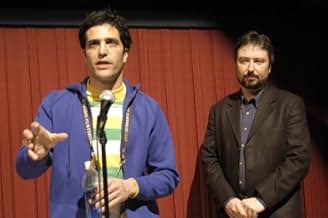IMDb RATING
7.4/10
3.8K
YOUR RATING
The remarkable story of The Weather Underground, radical activists of the 1970s, and of radical politics at its best and most disastrous.The remarkable story of The Weather Underground, radical activists of the 1970s, and of radical politics at its best and most disastrous.The remarkable story of The Weather Underground, radical activists of the 1970s, and of radical politics at its best and most disastrous.
- Nominated for 1 Oscar
- 4 wins & 4 nominations total
Lili Taylor
- Narrator
- (voice)
Jim Lange
- Additional Narrator
- (voice)
Bill Ayers
- Self
- (as Bill Ayers)
Skip Andrew
- Self
- (archive footage)
- (uncredited)
L.D. Barkley
- Self
- (archive footage)
- (uncredited)
Ivan Boesky
- Self
- (archive footage)
- (uncredited)
Fidel Castro
- Self
- (archive footage)
- (uncredited)
Storyline
Did you know
- TriviaIn the segment about the accidental explosion of the Greenwich Village townhouse at 18 West 11th Street, Dustin Hoffman can be seen standing next to a fire truck observing the scene. He was living in the townhouse next door with his wife at the time, Anne Byrne.
- ConnectionsFeatured in The 76th Annual Academy Awards (2004)
Featured review
The Weather Underground presents a well-balanced view of the militant faction of the 1960s anti-war group that orchestrated a series of direct actions (including bombings) in protest of the Vietnam War and American imperialism.
To its credit, the film is not overly sympathetic to the members of the group. Rather, it portrays them in a direct and logical manner that tends to explain their more violent activities as the desperate attempts of extremely dedicated activists to engender dynamic change in lieu of those "publicly-sanctioned" methods which they felt were not sufficiently powerful to stop the war machine (i.e., non-violent demonstrations). It should be mentioned that none of the group's bombings resulted in injuries to people, with the notable exception of 3 WU members who were killed accidentally while making a bomb that was destined for an ill-advised attack on military personnel - a seminal moment the the organization's history that "opened their eyes" to the darkness they were headed towards. One cannot help but wonder what would have transpired had that attack been carried out - this is the chilling central lesson of the film, poignantly described by one former member who plainly stated that "the violence didn't work."
At the screening I attended the audience had the good fortune of listening to two of the Weather Underground's key members in person: Bernadette Dohrn and Bill Ayers. This proved particularly interesting, as both individuals, while still espousing their anti-militarism/anti-imperialism views to strong effect, did not express the need for radical tactics as one would imagine they may (given the current climate gripping the nation). Instead, they talked of engaging the issue through learning, organized activism, personal growth and social consciousness/responsibility.
It is this dialectic that makes this film so important right now, and I think that the directors have made an important step towards educating Americans in the subject of social awareness. My only complaint is that this lesson needs a counterpoint, something to break the ultimately sad feeling that one is left with when the screen flickers off at the end. Perhaps if viewed in tandem with a film that explores the victories that have been made through non-violent protest "The Weather Underground" can achieve its best potential.
To its credit, the film is not overly sympathetic to the members of the group. Rather, it portrays them in a direct and logical manner that tends to explain their more violent activities as the desperate attempts of extremely dedicated activists to engender dynamic change in lieu of those "publicly-sanctioned" methods which they felt were not sufficiently powerful to stop the war machine (i.e., non-violent demonstrations). It should be mentioned that none of the group's bombings resulted in injuries to people, with the notable exception of 3 WU members who were killed accidentally while making a bomb that was destined for an ill-advised attack on military personnel - a seminal moment the the organization's history that "opened their eyes" to the darkness they were headed towards. One cannot help but wonder what would have transpired had that attack been carried out - this is the chilling central lesson of the film, poignantly described by one former member who plainly stated that "the violence didn't work."
At the screening I attended the audience had the good fortune of listening to two of the Weather Underground's key members in person: Bernadette Dohrn and Bill Ayers. This proved particularly interesting, as both individuals, while still espousing their anti-militarism/anti-imperialism views to strong effect, did not express the need for radical tactics as one would imagine they may (given the current climate gripping the nation). Instead, they talked of engaging the issue through learning, organized activism, personal growth and social consciousness/responsibility.
It is this dialectic that makes this film so important right now, and I think that the directors have made an important step towards educating Americans in the subject of social awareness. My only complaint is that this lesson needs a counterpoint, something to break the ultimately sad feeling that one is left with when the screen flickers off at the end. Perhaps if viewed in tandem with a film that explores the victories that have been made through non-violent protest "The Weather Underground" can achieve its best potential.
- How long is The Weather Underground?Powered by Alexa
Details
Box office
- Gross US & Canada
- $564,632
- Opening weekend US & Canada
- $13,984
- Jun 8, 2003
- Gross worldwide
- $564,632
Contribute to this page
Suggest an edit or add missing content

Top Gap
By what name was The Weather Underground (2002) officially released in Canada in English?
Answer




























